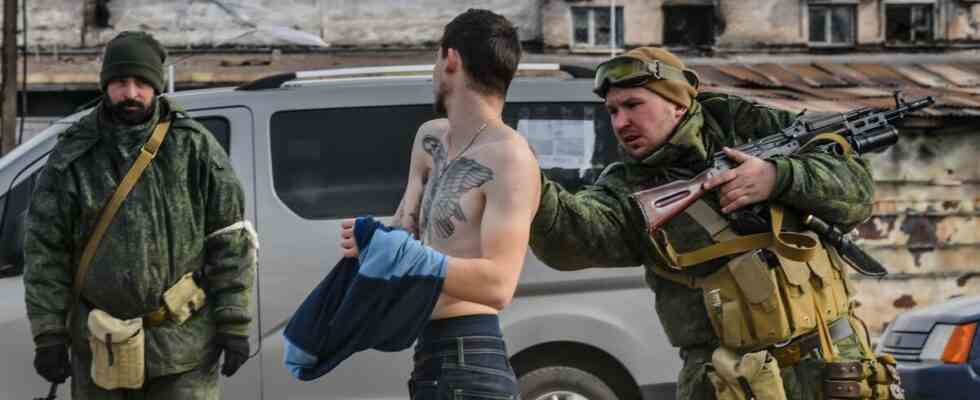“It was like a real concentration camp,” says Oleksandr. Ukrainians accuse the Russian regime of having set up “filtration camps” in the invaded country in order to detain and interrogate civilians. After being vetted, these civilians would then either be allowed to leave the occupied zone or be deported to Russia. 20 minutes discusses these allegations.
Interrogations, fingerprinting and searches
Oleksandr and Olena have told to the BBC having been detained in a Russian filtration camp while trying to flee Mariupol, which had almost completely fallen into the hands of the Russian army. According to them, this camp is located northwest of the port city, in the village of Nikolske. They recount despicable conditions with “one toilet and one sink for thousands of people”, interrogations and searches of their digital devices.
A testimony similar to that of Dmitry, questioned by France Info. With his family, he managed to escape from Mariupol, after a forced passage in the Russian filtration camp of Manhush where mass graves seem to have been dug by the Russian army. The refugee, now in Zaporijia, recounts searches, “very long and aggressive interrogations”, “strip searches” and fingerprinting.
Same story in the British newspaper The Guardian. Our colleagues collected the testimony of two women who requested anonymity, terrified at the idea of suffering reprisals from Moscow. They also claim to have been parked in a Russian filtration camp, this time in Bezimenne, a coastal town east of Mariupol. This camp made up of blue and white tents can be seen on satellite images, broadcast by Maxar Technologies.
Forced deportations
Photographs, fingerprinting, interrogations, searches of their phones, etc. The two civilians questioned by The Guardian tell of similar living conditions to the other witnesses. The group they were part of – consisting of around “200 or 300 people” – was then taken to Vladimir in Russia (east of Moscow).
Last Wednesday, the Chairman of the Humanitarian Committee of the Ukrainian Parliament, Mykyta Poturayev, affirmed that “half a million Ukrainian citizens have been deported from Ukraine to the Russian Federation without their agreement”. “I never asked to be taken away. The filtration camps, the trip, it was very traumatic, ”testifies to the Guardian a Ukrainian civilian.
On Sunday, the United Nations High Commissioner for Refugees counted 605,815 Ukrainian refugees in Russian territory. Ukrainian President Volodymyr Zelensky said on BFM TV that these citizens had “disappeared”. “They are in special camps on Russian territory,” said the leader. An accusation that Moscow denies en bloc and whose veracity has not been independently established.
Accusations against the ICRC
Last Wednesday, a Ukrainian official accused the International Committee of the Red Cross of being an “accomplice” in these “deportations”. “The ICRC is not fulfilling its mandate” concerning the people who would be forcibly evacuated to Russia, estimated Lioudmyla Denissova. The ICRC, of course, denied these accusations. In charge of public relations for the NGO, Frédéric Joli recalls that the ICRC is “guardian of humanitarian law” and repeats that it did not participate in the deportation of Ukrainian civilians to Russia. The “deportation for forced labor, or for any other purpose, of civilian populations in occupied territories” may constitute a war crime according to the Nuremberg Charter.
“Our main concern is to reach the victims of this conflict”, recalls Frédéric Joli who regrets that these accusations “pose a problem for the ICRC” on the ground “for the safety of [ses] teams and for [ses] evacuation operations.

